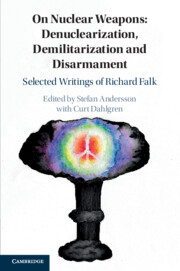 On Nuclear Weapons: Denuclearization, Demilitarization and Disarmament
On Nuclear Weapons: Denuclearization, Demilitarization and Disarmament Book contents
- On Nuclear Weapons: Essays by Richard Falk on Denuclearization, Demilitarization, and Disarmament
- On Nuclear Weapons: Essays by Richard Falk on Denuclearization, Demilitarization, and Disarmament
- Copyright page
- Dedication
- Epigraph
- Contents
- Foreword by Zia Mian
- Preface by Richard Falk
- Acknowledgments
- Part I International Law and World Order
- Part II Impacts of Democracy, Neutrality, and National Interest
- Part III Nuclear Policy Initiatives
- Part IV Remembering the Past, Encountering the Future
- Index
- References
Part II - Impacts of Democracy, Neutrality, and National Interest
Published online by Cambridge University Press: 04 July 2019
- On Nuclear Weapons: Essays by Richard Falk on Denuclearization, Demilitarization, and Disarmament
- On Nuclear Weapons: Essays by Richard Falk on Denuclearization, Demilitarization, and Disarmament
- Copyright page
- Dedication
- Epigraph
- Contents
- Foreword by Zia Mian
- Preface by Richard Falk
- Acknowledgments
- Part I International Law and World Order
- Part II Impacts of Democracy, Neutrality, and National Interest
- Part III Nuclear Policy Initiatives
- Part IV Remembering the Past, Encountering the Future
- Index
- References
Summary
Prospects for democratic governance are definitely connected with the dynamics of hegemonic statecraft. For instance, it is notable, as Eqbal Ahmad has pointed out, that fascism flourished in the interwar period precisely in those states among the capitalist industrial powers (Germany, Italy, and Japan) that had been substantially excluded from the imperial game of colonizing non-Western peoples and expropriating their raw materials. It is also notable that hegemonic leaders of the day “provoked” a lethal rivalry for colonial spoils that eventuated in general war.
In our own era there is an apparent link between postcolonial hegemonic tactics and antidemocratic interventionary diplomacy, part of an overall plan to make the world as safe as possible for multinational corporations and banks. Capital flows depend upon stable political environments that offer rewards by way of profits, and stable political environments can only be achieved, given mass discontent and mobilization rampant in the Third World, by institutionalizing repression.
- Type
- Chapter
- Information
- On Nuclear Weapons: Denuclearization, Demilitarization and DisarmamentSelected Writings of Richard Falk, pp. 137 - 220Publisher: Cambridge University PressPrint publication year: 2019
